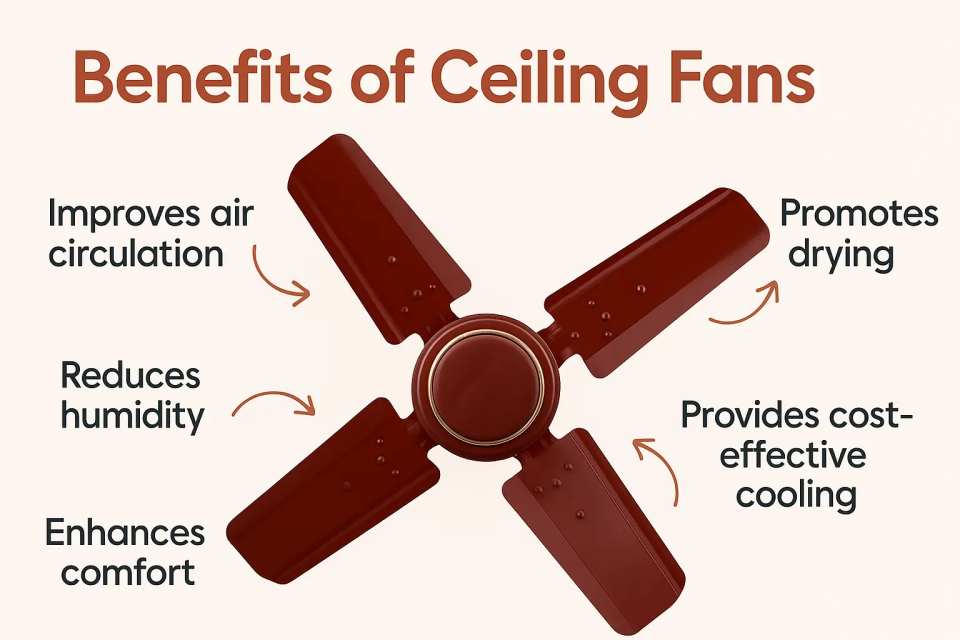
Let us take a fancy to one of those scorching summer nights with sticky feelings. It drove you insane the first time? Turn on the ceiling fan and pray that the stifling humidity will at least be relieved. However, when the blades begin moving, it may occur to you that the ceiling fan will not do you any good in terms of humidity but rather just circulating hot and sticky air.
Have you ever wondered about the question, does a ceiling fan help with humidity, you are not out alone? This is the question most people have asked with endless arguments and misunderstandings. And the reality is not black or white in terms of a yes or no answer and knowing the science of it all can make you have a better living environment.
First, we have to understand what humidity really is. Humidity is the moisture content of the air, and falls into two categories absolute humidity (the actual moisture) and relative humidity (the percentage of moisture that the air can hold versus the highest level at a given temperature).
Consider air to be a sponge. A warm sponge will retain a greater amount of water compared to a cold one. When we complain about that muggy, sweaty feeling we are generally talking about high relative humidity.
Air circulation such as that offered by a ceiling fan does not alter water vapor content of the air. This causes a wind chill effect that aids your body to cool by the standard cooling mechanism. It is like when you feel cooler on a hot day because there was the stimulus of a breeze even though the temperature did not decrease.
Read More: How to Install a Ceilling Fan
The ceiling fan does not dry the air, however, you may get this impression as it dries out the surface of the skin, making you feel slightly better on humid days, say for example
Drying Clothes: Fans accelerate the evaporation of the moisture contained in wet clothing.
So, it just creates a localized effect and doesn't really dry the air.
Myth Buster: Fans do not make the air drier--they only move the moisture elsewhere. In order to actually dehumidify you would require a specialized device.
The simple answer to this question is no, ceiling fans do not reduce humidity in your house. When a ceiling fan moves the air it does not dry out the place. They are not dehumidifiers-they are circulating devices.
A dehumidifier literally removes moisture in the air using condensation or absorption thus reducing the moisture content. The ceiling fan on the other hand just moves the air available in a room. The level of humidity does not vary in any way with or without the fan.
This is a critical difference since most homeowners hope that the ceiling fan would act as mini dehumidifiers, and are disappointed when the levels of humidity cannot be reduced and wonder “Do ceiling fans lower humidity?”

But then there was the question of why we feel so much better when ceiling fans are on even though they cannot really make a room less humid. The reason is due to the manner in which our bodies interpret and react to air with movement.
Air that passes over your skin increases the rate of evaporation of the perspiration. This is because as you evaporate, your body cools to give an impression that it is less humid despite the fact that nothing has resulted from this evaporation in terms of change in moisture content of air. That is also the same principle that causes you to be cooled down once you get out of a pool on a windy day.
Although the fan does not literally take moisture out of the air, it will have the effect of drying your skin and breathing passages in general by drying out the exposed surfaces through the process of evaporation.
Now here are some of the fact based based approaches that will help you stay as much comfortable as possible when the weather is humid:
Opt for the Correct Direction: Some fans come with the option of changing direction, during summer, the fans should rotate anti-clockwise to push the air downwards blowing a cooling breeze. During winter months it needs to turn the opposite or clockwise direction to give a mild circulation of warm air at a time when there may be an open draft.
Speed Settings- Increase speed at high humidity times and reduce less at the background. The majority of the individuals are most comfortable at medium speeds.
Strategic Placement: Place fans to cross-ventilate wherever possible pushing the air around by the wind flows where there is high humidity to the other locations where there is low humidity.
Add inappropriate ventilation: Keep windows open in low-humidity times and employ admirers to pass on this drier air all through your house.
Couple with Dehumidifiers: Dehumidifiers are great in serious cases of humidity; the drier air will circulate better with ceiling fans.
Myth Buster: Reality Check for Humidity vs Fans
|
SN |
Myth |
Reality |
|
1 |
Ceiling fans reduce humidity |
Ceiling fans do not reduce humidity, fans only circulate air |
|
2 |
Using fans for long duration result in decreased humidity |
Long duration doesn’t have any effect, fans just make you feel better by creating a local effect. |
|
3 |
Faster speeds = less humidity |
Faster speed will only help in air movement not to the moisture content |
|
4 |
Fans work like dehumidifiers |
No, a fan doesn’t work like a dehumidifier. Dehumidifier is a specialized device that extracts moisture from the air. |
The bottom line is clear: do ceiling fans help with humidity? Not in the way most people think. Ceiling fans don't reduce humidity levels, but they absolutely can make humid conditions more bearable by enhancing your body's natural cooling mechanisms.